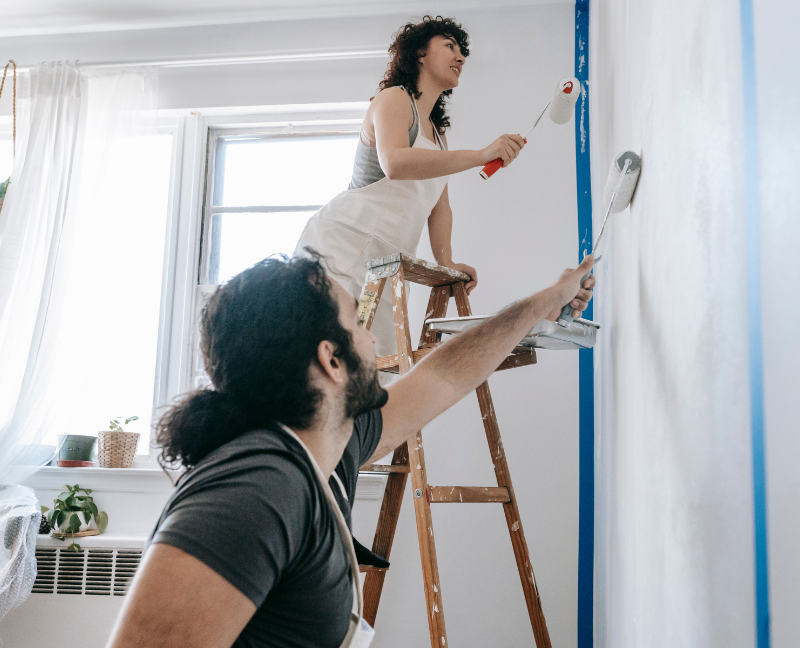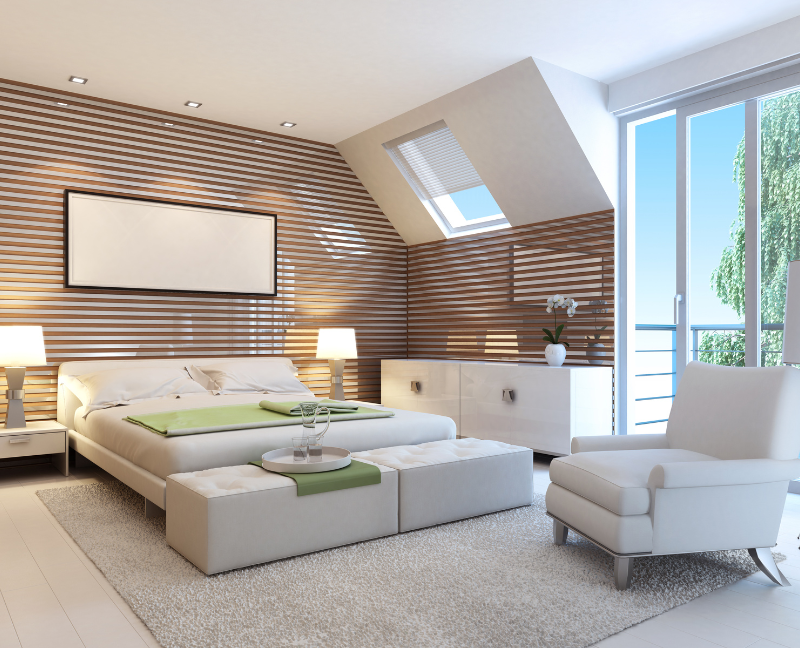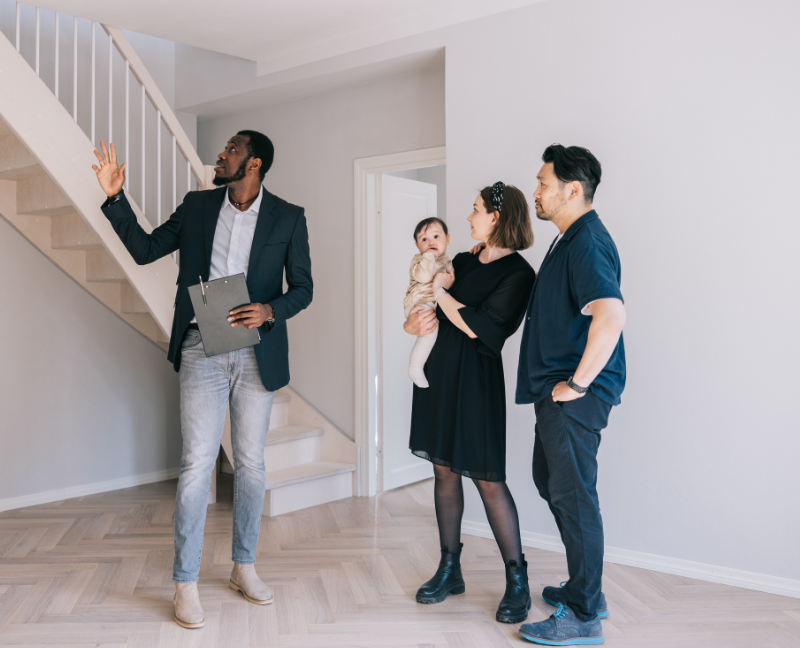By developing a neighborhood guide, real estate professionals can demonstrate their skills, position themselves as local experts, and build trust with prospective customers. This is a strategic strategy to highlight their expertise.
Whether you are appealing to buyers or sellers, a carefully produced guide has the potential to be an effective lead magnet and a foundational component of your marketing approach.
Neighborhood guides benefit potential buyers by providing thorough information about the neighborhood's amenities, schools, way of life, and market trends. They help buyers imagine what life would be like in a particular place. When you're a seller, they show you know much about the area and can market it well.
These guides help your clients immediately and make you a hyperlocal expert, giving you an edge over other agents. They're also great lead makers who can bring people to your website, get their contact information, and turn those leads into loyal customers.
Get to know the area inside and out to make a complete neighborhood guide that people will like. This study will also make you a specialist in the field, making the guide more valuable.
We'll go over the main points you should make more in-depth below:
2. Organize Your Guide
Divide your guide into sections that are interesting and easy to follow. For instance:
3. Make It Eye-Catching
Make the guide visually appealing by using excellent photos, maps, and infographics. Professional photography lends a sense of legitimacy, and design tools can assist in producing well-designed layouts.
Graphic Design Tools
Stock Image Sources
Geographical Mapping And Visualization
Work With A Designer
You may find graphic designers with real estate marketing experience on sites like 99Designs or Upwork if you want a genuinely expert touch.
Keep A Consistent Branding
Throughout the book, make use of the colors, typefaces, and logo of your company. Your professionalism is reinforced and your guide is easily identifiable with a unified design.

Ensuring your community guide's content conforms with Fair Housing Act regulations and stays away from discriminatory language or practices is crucial. Discrimination in housing on the grounds of race, color, national origin, religion, sex, family status, and disability is illegal under the Fair Housing Act.
Use The Right Words
Pay more attention to the neighborhood's characteristics than its residents when discussing it. Highlight the local schools, parks, recreational opportunities, and housing possibilities. For example:
Rather than saying: "This neighborhood is ideal for young families."
Say this: "There are great schools, playgrounds, and recreational facilities in this area."
Furthermore, make use of inclusive language that captures the neighborhood's variety by referencing community or cultural activities without giving the impression that they are restricted to any one group. This guarantees that the description will always be inclusive.
Emphasize The Facts Rather Than Your Preferences.
Instead of using your descriptions to support your subjective beliefs or presumptions, base them on objective facts. For instance:
Rather than saying: "This neighborhood is ideal for seniors and is quiet."
Say this: "Easy public transportation, a great senior center, and accessible walking trails are some of this neighborhood's amenities."
Be Cautious With Schools And Education
Avoid forming subjective opinions on the quality of schools, even though they are a significant consideration for many purchasers. Rather:
Avoid Steering
Depending on personal traits like color or family status, steering is the process of directing consumers toward or away from particular communities. Your guide should give clients the freedom to make their own judgments while presenting facts in an impartial manner.
Make Sure Your Material Is Updated
Make sure your neighborhood guide is up to date with the latest rules, laws, and best practices by reviewing it frequently. If in doubt, have your content reviewed by a legal or compliance specialist.
ChatGPT and other artificial intelligence (AI) techniques can improve the content of your guide and save time. Here are some examples of how to incorporate them:
Use these SEO best practices to increase your guide's exposure in search engine results:
A lead magnet is a useful resource or piece of content that is provided to prospective customers in return for their contact details, like phone number or email address. By catering to their particular requirements or interests and offering instant value during the early stages of relationship-building, it acts as a tool to draw in prospects.
On Your Webpage
Use a call to action (CTA) such as "Download our comprehensive guide to living in {neighborhood}!" to highlight the guide on a special landing page."
When it comes to email marketing
To cultivate your email list, use the guide. For instance:
On Social Media
Posts such as "What's it like to live in {neighborhood}? " hint at areas of the book. See our in-depth guide!"
Using Facebook advertisements and PPC
To increase visitors to your landing page, run Facebook advertisements or targeted pay-per-click (PPC) campaigns. Make use of persuasive advertising language that emphasizes the benefits of the guide, like "Learn all there is to know about {neighborhood} -- get our free guide right now!"
Preparing your house for potential buyers to view is known as staging. You want to make a good impression and show them a home where they can picture themselves living and being tidy and attractive. There are a few simple actions you can take to stage your property if you're planning to sell in Indiana.
While it might seem obvious, you should make sure your home's interior is clean before you show it to potential buyers. Although you could hire a cleaning service, you could be able to accomplish most of the cleaning yourself in the days leading up to your home's opening.
Your house will appear brand new if you complete simple tasks like dusting, mopping, or sweeping the floors, and wiping down kitchen surfaces. Even though the interior won't stay that way when a buyer comes in, it's important to make your home appear as attractive as possible because even a basic dirty interior might act as a turnoff.
Grooming your home's exterior will help improve its appearance, much as cleaning the interior. Potential buyers will see your house first when they pull up to the neighborhood, and you only have one chance to make a good first impression. Weed infestations and overgrown lawns turn off buyers. So, to prevent that situation, you can hire a lawn care service if your lawn is quite large, and you might also hire one if you have a lot of bushes or hedges that need to be trimmed (though you can do that yourself as well). Your home will look fantastic with a new lawn and some flower beds.
If a homeowner has lived in their Indiana home for a long time, painting the house's exterior and inside may be necessary to cover up chips, scuffs, and worn surfaces.
Applying a new layer of paint will enhance the impression that the house is brand-new. Repainting can also be a step toward redecorating if you wish to switch to a more complementary or neutral color scheme.

Beyond simply making your house seem nice, the staging also includes strategies like the blank canvas to help prospective buyers picture themselves living there. It is therefore advisable to store any personal objects you may have scattered across the property or added to the décor in a closet or storage facility so they are hidden from view.
Remember, the idea is for purchasers to picture themselves living in the house, therefore even elegant personal belongings should go. Personal belongings can only work against you in that regard.
Perhaps the greatest approach to updating your home is to redecorate or renovate it. If you want your house to look well on as many people as possible, go for straightforward styles and muted color schemes. A modern interior utilizes the newest trends in interior design and is something you should think about. In addition to using neutral hues, which are more likely to be liked by a wider range of people, it also helps your older home appear newer by incorporating the newest design trends.
Whether or not to remodel in the first place is the tricky element of this process. For example, everything within your home may be in excellent condition except for a few minor issues, like a misplaced kitchen island. For this phase, having a realtor may be quite beneficial as they will provide you with an expert set of eyes and advise you on whether or not to redesign or repaint the inside.
Replace or repair any appliances that come with the residence if they need to be fixed. In addition, fix any other broken items in your house, such as drawers, cabinets, and doors. Anything that isn't working correctly will simply turn off customers.
Since purchasers account for renovation and repair expenses when placing bids, homes with these features typically have higher values. They prefer to purchase a home that is ready to move into rather than one that requires repairs or renovations, and they might give you a higher offer on the money you've saved them on improvements.
Over the years, we've helped home sellers stage and market their homes to get the best offers, and our goal is to help more. So whether you're planning to level up the interior and exterior of your property or want to reach more potential buyers, we're happy to guide you!
Click this link to get started or call us at 317-298-0961 today!
The year has just started; however, don't buy in haste like everyone else. With enough patience (and guidance from your trusted real estate agent), you might land a better deal.
Traditionally, the most popular seasons to purchase a home are spring and summer. The school year is ending, the weather is pleasant, and inventory is high. However, there is more competition and a larger price tag for shoppers during this busy buying season. Purchasing a property now offers several advantages to those prepared to withstand the winter months.
Although there is typically less inventory for winter homebuyers, buyers benefit from less competition. According to studies, January is usually the month with the lowest housing prices of the year.
That said, January is the ideal month to purchase a home for several reasons, including the likelihood of an increase in mortgage rates shortly.
When compared to the summer buying season, January home prices usually decline. According to statistics, the average price of a property sold in January and February was 8.45% less than that of a home sold in June through August.
Due to low inventory levels, home prices are probably going to rise much more than they usually do in the spring.

Because of the inventory-to-sales ratio, the number of available properties, and the level of competition, January is still a good time to buy.
With about the same quantity of market inventory, you essentially face nearly half of the competition. This could result in fewer properties up for bid and more space for haggling with sellers.
Additionally, the gap between listing and sale prices is typically greater during off-peak times for house purchases. For buyers, this may offer undiscovered savings.
Economists predict more rate hikes when they hit historic lows, meaning future homeowners will pay more each month.
January is a great time to place your bid because mortgage rates are probably the lowest of the year, prices are lower, and there is less competition.
If you're looking for homes in Indiana with the best rates, our team at RE/MAX Advanced Realty is here to help!
Selecting an apartment is not simply about deciding where to sleep. Finding a place that fits your needs both financially and lifestyle while also making you feel comfortable is key.
Selecting between a studio and a one-bedroom apartment can be difficult for many renters who are fortunate enough to live alone or with simply a spouse. While each option has its own perks, there are drawbacks, too.
The question is: which would you prefer—a simpler, lower-rent place to live in or a little more money upfront for greater room and privacy? Whether you like a one-bedroom apartment's more space or the studio's minimalist charm, choosing between the two can have a big impact on your monthly budget as well as how you live, work, and entertain.
A studio apartment's open floor layout incorporates the kitchen, living room, and bedroom into one sizable area. This setup's simplicity may be very appealing, particularly to those who like a minimalist lifestyle.
Additionally, they can save you money. According to Shara Seigel, a public relations specialist in New York City and owner of a studio apartment, “Studios are generally much more affordable than one-bedroom apartments.”
The forced organization that comes with living in a studio is another benefit. When you have less room, you're not as prone to gather pointless things.
“It forces you to not have too much extra ‘stuff’ around and keep things neat/organized,” continues Seigel. Naturally, studios urge you to live a minimalist lifestyle, in which everything has its proper place. For someone who appreciates decluttered living and doesn't mind cozy quarters, this can be a welcome adjustment.
Furthermore, studios might provide greater layout flexibility. You may easily arrange the furnishings and decor in the room to suit your needs because no walls are splitting it up. Despite the small size of her studio, Seigel observes that she managed to utilize it for several purposes.
The mindset of “My apartment is my bedroom, living room, gym, and office in one.” is typical of studio residents, particularly those who work from home. According to Seigel, she works out more when her workout equipment is close to her bed than when she has to drag herself to the gym every day.
A studio's open floor plan might occasionally feel confining, particularly in terms of privacy. It might not be enough to have all of your spaces—eating, sleeping, and working—in one room if you entertain frequently or work from home.
Studios might be effective, but they might not be the ideal choice if you need specific locations for partying or seclusion, as Seigel acknowledges, adding that “one downside is I rarely have company over — there is not much space to host or entertain.” Additionally, if you share the home with a partner, managing different mealtimes, bedtimes, and work meetings if you're both remote may be difficult and need creative thinking.
The thing with a one-bedroom flat is that it provides a clear division of the living spaces. The living area and bedroom are separate in these apartments, giving you extra space and privacy.
Grace Moser, owner of the women’s lifestyle blog Chasing Foxes, says that the reason she loves living in a one-bedroom is because she doesn’t live alone. “When you’re living with another person, having one open space can be a bit difficult. It’s nice to have a separate living room where [my husband] can go to read and do his own thing.”
It is undeniably true that couples particularly value this additional space. Separate rooms offer more privacy and freedom than studios, especially if one individual works from home or has a different schedule.
“Since we both work from home, it’s easy to get distracted with each other and talk. But having a different space where we can both focus on our work … has been super helpful!” Moser adds.
The kitchen and dining spaces are also larger in a one-bedroom apartment. Larger kitchens are a feature of many one-bedroom flats, which can be extremely beneficial if you like to cook or have guests.
Moser says that one of the benefits of her one-bedroom is her bigger kitchen — “which means you’ll have a less crowded countertop or cupboards.” Having this additional room not only improves daily life but may also be beneficial to your emotional well-being. A home that is well-balanced and less stressful can be achieved by designating specific spaces for sleeping, relaxing, and cooking.

One-bedroom apartments are often more expensive than two-bedroom ones, but if you divide the rent with your partner, a one-bedroom apartment will typically be less expensive (if you enjoy doing financial and mental gymnastics).
“One-bedroom apartments can be more expensive in terms of rent and utility,” Moser points out. A studio and a one-bedroom might cost very different amounts, depending on where you live. She does point out, though, that in certain places, studios can cost just as much as one-bedroom apartments.
And then there’s clutter. “When you have more space, you also have more room to bring in more items, which can lead to more clutter,” she says. A one-bedroom apartment offers more space, but it also necessitates more deliberate organizing to prevent acquiring unnecessary items. A smaller studio, however, makes you more careful about things you bring into your house.
Both studio and one-bedroom apartments have their own pros and cons; the only way to know which of these two is right for you is to determine your specific needs, lifestyle, and budget.
A studio can be the ideal choice if you appreciate affordability and do well in a basic setting. For those who don't want much space for guests or activities, or who spend a lot of time outside the house, studios are a good option.
They can be an excellent option for folks who don’t want to be “rent poor,” as Seigel puts it. “I’m not rent poor and therefore able to spend money on other things that are important to me — food, clothes, travel, experiences!”
The extra space of a one-bedroom, however, could be invaluable if you value privacy, require more space for entertaining, or work from home. A separate bedroom gives you a calm, relaxing space to sleep in apart from the stress of your everyday schedule. A one-bedroom apartment can make living more pleasant and practical for couples or people who just want a larger, more spacious living arrangement.
As Moser puts it, “I would choose a one-bedroom apartment over a studio. I don’t feel crowded in, and I feel more relaxed when I come home to a more spacious place. Things honestly just feel so much better.”
Would you choose a studio or a one-bedroom apartment?
For those who have started to browse our website on homes for sale, as well as properties in the surrounding area, there are massive advantages to viewing homes that you are considering in person. Although virtual tours and online profiles can provide exceptional detail regarding the homes you view, they cannot reveal everything. Instead, getting an up-close look at a single-family house or luxury townhome can paint a picture of what it would be like to live on the property.
You have two choices for in-person property viewing: private tours and open houses. Each has its own set of advantages and disadvantages. To help you know which suits your current needs, we've provided the main pros and cons below.
PRO: You'll be able to see the neighborhood up close
The chance to tour the area is one of the key benefits of going to an open house. Realtors frequently invite neighbors and other community members to open house events.
This allows potential buyers to interact with possible neighbors and obtain unbiased perspectives about what it's like to live in the community. The number of residents who attended but are not interested in purchasing the property can vary depending on the area's size and layout. There is very little likelihood of meeting your new neighbors on a private tour.
There's freedom to come and go during the designated event times at open houses. You are free to take a break, go for a tour of the area, and then return to speak with the realtor. On the other hand, private tours are by appointment only, therefore this is not a possibility.
CON: The event can be super busy
There are advantages to meeting possible new neighbors, but there are drawbacks to large gatherings. This is particularly true for properties in high demand since they can draw dozens of potential buyers to a single open house.
Private tours are frequently the better option if you are someone who doesn't like crowds. On the other hand, if a private tour isn't offered for a certain house, make an effort to go to weeknight open houses. These only draw serious purchasers and are typically less crowded than weekend open houses.
PRO: No pressure to make an offer
Attending an open house is a low-stress endeavor. There are a lot of people there, so it's easy to come and go without getting seen (if desired). You can feel much less anxious about the scenario because you do not receive the personalized attention that you would in a private tour.
This is particularly beneficial for those who are just beginning the home-buying process and are unsure of their future residence. You made up your mind not to like the house? Not an issue. There will be many other people there who will probably fall in love with the property.
Ask questions as they come up during your self-guided tour, which you can take at your own speed.

PRO: Receive one-on-one attention the entire time
When it comes to house tours, are you the type of person who prefers a more exclusive, posh experience? Making reservations for private property visits is, without a doubt, your best option.
You will have one-on-one attention from an agent the entire time your reservation is made. You can ask as many questions as you'd like, and there's no danger of getting lost in the crowd. To increase your chances of having your offer accepted while you are contemplating a home, it is essential to arrange a private tour.
If you don't like the feeling of being rushed, private tours offer a laid-back setting where you can examine each area at your leisure, pose questions, and get a sense of the overall design.
In the end, choosing a proactive tour will help you feel less stressed during this hectic period of your life. During a private tour, a professional real estate agent will never make you feel rushed or constrained by their schedule.
Cons: Not ideal for first-time homebuyers
Have you just started looking for a place to buy? If so, there's a chance you don't currently have an agent you can work with to arrange a private trip. You need to make an appointment with an agent for a private home tour before you are allowed to visit the property.
Taking a personalized tour could seem like a high-pressure commitment, even if you have an agent already. People who are just beginning the process of becoming homeowners might want greater liberty and flexibility to come and go as they choose, without having to respond.
Pro: Establish a connection with your realtor
Having the chance to get to know your realtor is just another fantastic advantage of setting up one or more private visits. You can begin establishing a rapport with your selected real estate agent after just one trip.
This will help your realtor understand your tastes and personality better, which will ultimately help them choose the kind of house you are most interested in. You will consequently be matched with your ideal Indiana home faster.
If you're looking for the best realtor in your area, we have one for you! Just let us know where you're from and your concern -- buying or selling a home and we'll guide you.
Leave a comment or send us an email to get started: dennis@indyhomepros.com
Selling a home is not only a huge decision to make, but also a complicated process to take. If you want to simplify the journey while increasing your earning potential, the key is to get yourself ready.
Wondering what those questions are?
Don't worry! In this post, we've compiled all the questions you should ask before putting your property on the market.
Have you considered putting your house up for sale soon? Before moving on to the next step, you must ensure you have answered these essential questions about selling a house.
Below are the following questions about selling a house:
Selling your property is possible year-round, but some months are more accessible, faster, and more rewarding. Home buying is highest in spring and summer and lowest in fall and winter.
Selling your home in June, May, or July maximizes house profits. Homes sold in June and May earn 9.2% and 7.4% more than average. The day you list your home matters, too, according to data. On Thursdays, homes sell faster and for more money.
However, real estate is very localized, so the ideal selling period depends upon your market and homeowner's situation. Think about:
The time to sell depends on location and housing market conditions. Listing price, home condition, and marketing and staging skills also matter. According to NAR data, the average home is on the market for 62 days. It varies widely by state. You should know how fast your home will sell in your market.
Condition and demand for similar homes impact your home's value. It would be best to look at comparable sales to estimate the value of your home. They should match your size and condition. These "comps" help a real estate agent price your home. Alternatively, an iBuyer might buy your house without listing it.
Selling a house has several costs. Many don't require an upfront payment, which is good. Instead, many come from closing sales revenues. Typical fees are 10% of your home's sale price.
These include:
Selling to an iBuyer, skipping the real estate agent, or selling as-is can reduce these fees. A home that needs lots of repairs will sell more slowly.

Many homebuyers want a "move-in ready" property with minor repairs. Younger buyers (76%) need a move-in ready house. Cosmetic repairs increase house value, so make repairs before selling.
Fix severe faults like a roof or AC unit, or boost your rate. Most purchasers won't pay top dollar if massive, expensive projects are coming.
Seller inspections speed up repairs. For a few hundred dollars, home inspectors can check for issues. The report can guide pre-listing repairs. This can increase property value and speed inspections. Your state may require inspection issues disclosure.
Using a realtor has its own perks and cons. One advantage when working with a real estate agent is that they can help you sell your home faster. Listing, photography, showings, marketing, and closing are some of their services that can make your home-selling journey easier and smoother. They also have local market data to assist you price and marketing your home properly.
Pro Tip: Before hiring a real estate agent, be sure to research their services first. Look at past customer reviews to ensure they can provide the service you want. You may also seek referrals from family, friends, and coworkers.
A seller can inspect your home before listing. Some sellers do this, but it might help you prepare your home for sale. Even if you do, a home inspection is usually required after you accept an offer. After hiring a local inspector to assess their property, the buyer may request that you credit them for a few repairs.
The thing is, you may not be able to sell your home immediately. If that's the case, the first thing to check is the pricing as it may be overpriced for the market. Try to adjust the listing price based on recent similar transactions. Stage or fix any issues that prevent purchasers from buying your property.
Also, make sure your agent has marketing experience and local contacts. This boosts home visibility and sale potential. You may also remove the home from the market until local conditions improve.
As much as possible, you need to leave any fixture attached to the house. That might include built-in storage, shades, door hardware, etc.
However, if there's any installed appliance that you want to bring with you, you need to tell that to the buyer and state it in the contract.
Can you think of more questions to ask before selling your property? If yes, feel free to share them in the comments!
In exploring "Questions About Buying A Home," the initial considerations include establishing a housing budget within 25% of monthly income, optimizing a 5–10% down payment, and understanding the nuances of closing costs.
These financial insights, strategic planning for moving costs, and mindful choices in furnishing and decorating lay a solid foundation for informed and responsible home buying.
So, in this part, let us continue discussing the questions to ask about buying a home.
If you've never lived in a hurricane-prone area, you've probably never had to defend yourself. Ask if your new home is prone to tornadoes, floods, wildfires, earthquakes, or ice storms. Then, make sure your house insurance covers local natural disasters. You may require extra coverage if not.
It’s hard to answer this problem independently; you need a house inspection before buying. Your seller must report known issues, although they may leave something out.
A good home inspection will explain the safety and performance of the roof, foundation, HVAC, and plumbing systems safety and performance. If there are red flags, you can pass or negotiate a cheaper price and solve the issues yourself.
Asphalt roofs last 20 years, according to most experts. So, ask this critical roof inquiry before buying a house: How old has the roof been there?
Replacement of an aging roof might cost over $12,000. A sudden replacement might ruin your budget.
Imagine getting into your new home and discovering all the appliances are broken. You can avoid such a surprise if you know certain essential appliances are dying before buying the house. The vendor may also offer a good deal.
Ask about the lifespan of all house items and when the old or worn-out items will be replaced. This includes the HVAC, water heater, washer, dryer, fridge, stove, and dishwasher.
Since different states have varying regulations regarding what must be included in a property purchase, you must find out what is included with the house you purchase. Don't automatically assume you're buying every light fixture, appliance, and window covering when submitting an offer. If so, you can become unhappy when the refrigerator is gone, and there's a large empty area in the kitchen.

You should know what nearby similar houses are in the market. This will help you know if the home you seek is reasonably priced. You can get the answer from your real estate agent since they will be intimately familiar with the types of homes currently for sale in the neighborhood where you are looking to buy. And just so you know the technical terms, this is a competitive market analysis (CMA).
Find out why the seller is selling their home. Knowing their motivation in selling their property might help you negotiate.
For instance, sellers leaving because of a new job may be more likely to negotiate a price to sell it faster. Probing them can also help you learn more about the quality of the house.
It's a red flag if the seller can't clearly state their reason for moving or selling their home, such as looking for a bigger house or wanting to live close to their families.
Usually, when a home has been listed on sale for a longer time, it means that there might be an issue.
When a home is listed on the market for a long time, it might mean that there's an issue. Usually, it's because the asking price is too high, its location, or the home's layout.
In March 2023, U.S. residences averaged 54 days on the market. now, this number might be different depending on the location and season. Ask your real estate agent about house sales speed in your market—every market is different.
Conclusion
These are just some of the most important questions that you might ask regarding the homebuying process. There might be more as you go along the way. The key is asking as many questions as you can to your real estate agent and/or the seller before closing the deal.
Do you have more questions about selling or buying a home? If yes, feel free to drop them in the comments or call us at 317-316-8224 we can assist you!
Buying your home is thrilling and overwhelming at the same time, especially if you've never done this before. You might be working hard to save money for your down payment while your partner might be searching for ways to improve and renovate it as you both like.
Wherever you are in your planning, you must know that there are many things to consider as you set this path. Other than knowing how much deposit to save, you also have to check neighborhoods, shop different loan options, learn the art of negotiating, and many more. However, buying your first home should not always be terrifying. With the right guidance from real estate experts, you can make the entire process memorable and stress-free.
Taking The First Step
Taking the first step is the easiest and the hardest at the same time because this is knowing how much money to save for the property you want to buy.
How much the down payment will be and how long it will take to save depends on several things, such as:
Saving up thousands of dollars can seem intimidating, but you don’t have to starve yourself or forget your obligations just so you can save up. With the right budgeting skills and a couple of strategies, such as finding an additional source of income, you can do this.
It’s important to know what your target deposit will be.
How will you know, you ask?
You may start by searching the areas you want to buy the property to get an idea of how much down payment you'll need. It is also a good idea to look for recent sale prices of homes similar to the real estate in Indiana you want to buy to have an estimate. Check the average year-on-year percentage price increase. By doing so, you could have an idea of how much your first home will cost.

If you’re planning to get a mortgage loan or borrow from lenders, make sure you do research first and ask the following questions:
Asking these questions will also help you in setting your target savings.
Saving Tips For Home Deposit
Creating a realistic budget means including even the non-essential expenses you might have. This will help you understand which expenses you need to cut out or reduce.
Other than setting the amount you need to save, create a realistic timeframe as well when you want the savings to be completed.
Combine all your existing debts, repay them as soon as you can, spend less, and save more.
Every payday, put your savings deposit into this account and don’t transfer the money out or spend it unless it's for the down payment.
First-Home Buyers Fees
There are additional costs you may need to pay to finalize the purchase of your home, such as:
Save For Closing Costs
Closing cost is the process fee you pay to lenders when you close your mortgage. It includes attorney’s fees, appraisal fees, inspection fees, and other fees depending on the loan provider.
Applying For The Right Home Loan
Finding the right home is one thing; looking for a home loan that suits your needs is another. While there are many mortgage providers out online and offline, you must understand what comes with it first.
Some of the things you have to consider are:
Get A Pre-approved Loan Before Hunting Begins
Getting pre-approved is as close as getting your creditworthiness without having a purchase contract. Lenders verify your financial information once you complete the mortgage application and will tell you how much money you can borrow. They’ll also have a credit check.
When you are pre-approved, it will make sellers think that you are serious about getting the home you want. Just don’t be carried away if some lenders offer you a bigger loan than you applied for. Stick with your budget and only apply for loans that you can afford.
Close The Deal
Once everything goes smoothly and the seller accepts your offer, you can close on the real estate in Indiana. The average time takes at least 48 days. During this time you can process other things for the next steps like having the house for a home inspection, which can help you spot potential problems so you can fix them. It will also save you if you think that problems are a bad deal and walk away.
Whether you need help saving for a down payment or closing a deal, our team is here to help! Call us at 317-316-8224 or join our mailing list to get home buying and selling tips and the latest updates.

8313 W. 10th St
Indianapolis IN 46234
dennis@indyhomepros.com
317-316-8224